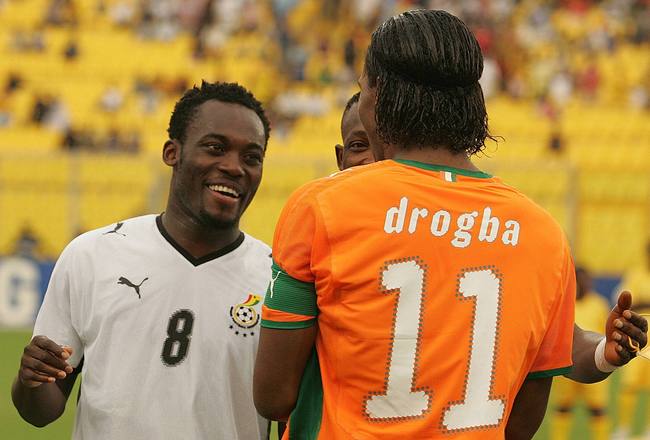By Sona Walla – November 11, 2013
With the bulk of their gifted players increasingly migrating away from the continent to ply their trade in top clubs all across the globe, African countries are finding that continuity in coaching in addition to their abundant football talent is now a key element for success at the national team level.
Headed into the crucial return leg of the final qualification play-off ties for the 2014 World Cup, the importance of continuity is again underlined as between the two legs national team coaches have had no access to their players who have been with their clubs. Coaches will have just about a week to work with their squads, make critical adjustments and produce a World Cup qualification ticket worth its weight in gold. Teams that have had stability in coaching and consequently more opportunities to test various combinations of players and tactical variations will have a higher chance of qualifying for the 2014 World Cup in Brazil. The following is a synopsis:
* Ghana: Coach Kwesi Appiah who was already part of the national team coaching staff three years ago in South Africa during that epic World Cup campaign that saw Ghana reach the quarterfinals has been fully in charge of the Black Stars since 2012. After close evaluation of his team’s performance at the African Nations Cup this past January, he has successfully corralled Ghana’s plethora of talents (Essien, Gyan, Muntari, Prince Boateng, Ayew…) for a common goal. He smartly inserted a dose of youth to galvanize his squad and has been testing and experimenting to mold them into a team that unites Ghana’s traditional entertaining attacking style with results. The outcome looks very promising and after a 6-1 undressing of Egypt in the first leg where he was forced to completely reconstruct his back-line due to a rash of injuries, Ghana seem well on their way to what would be a third consecutive World Cup qualification. Barring an Egyptian miracle, Ghana will be in Brazil next summer where they should be Africa’s best hope for glory.
* Côte d’Ivoire: Coach Lamouchi has also been in charge of the Elephants since the last African Nations Cup. The french-born coach of Tunisian origin has had time to draw lessons from that competition and find solutions on how to better organize his star-studded pool of players into the fearsome force many pundits predict they can be. Having trounced Senegal 3-1 in the first leg, the Elephants have depth, experience and seem poised for qualification.
* Nigeria: Nigerian coach Stephen Keshi, an undisputed Super Eagles legend, wisely elected to use the last African Nations Cup to make a clean break, rebuild and rejuvenate the team and utilize the competition to provide experience for his unseasoned side. Things fell into place and the young Super Eagles surprisingly won the competition which importantly bought them a ticket to this past summer’s Confederations Cup in Brazil, a dress rehearsal for the World Cup. There, Keshi’s boys faced world class competition in the likes of Spain and got an invaluable test run of what the pressure of the World Cup will feel like next summer. After beating an enterprising Ethiopia 2-1 away in the first leg, most would bank on the re-born Super Eagles securing their World Cup qualification at home.
* Burkina Faso: Belgian coach Paul Put took charge of Burkina Faso in March of 2012 and has had time to build a very competitive team. Put’s Stallions were the surprise of the 2013 African Nations Cup falling just short of glory in the final against Nigeria. Having edged Algeria 3-2 at home in a tight first leg match, the return from injury of their best player, left-footed play-maker Alain Traore, will give Burkina Faso a big boost as they seek a historic World Cup qualification.
* Cameroon: A major fiasco at the 2010 World Cup in South Africa under the Frenchman Le Guen who had been appointed out of desperation in the middle of the qualification campaign for the tournament, the Indomitable Lions’ ever-puzzling management continue to play musical chairs with coaches. This costly compulsion has led to one of Africa’s major football powerhouses missing the last two African Nations Cups, an unfeasible thought during the glory days of Roger Milla, Abega, Nkono and company.
Recently appointed in May 2013, new German coach Volker Finke also took charge in the middle of a World Cup qualification campaign and was therefore immediately saddled with the obligation to produce results. Predictably, he has had little wiggle room to experiment and change the dynamics of his team. Although there is a budding young crop of players who may well be able to transform the struggling Indomitable Lions, Finke has been reluctant to include them and seems rather to have opted for safety as his recall of older players such as Idrissou, Makoun, Webo… demonstrates. Lack of continuity and the absence of long-term planning may well cost the Lions again as they barely escaped with a draw in Tunisia during the first leg of play-offs. They will have little time and a very complicated task to find the right solutions to secure qualification at home.



